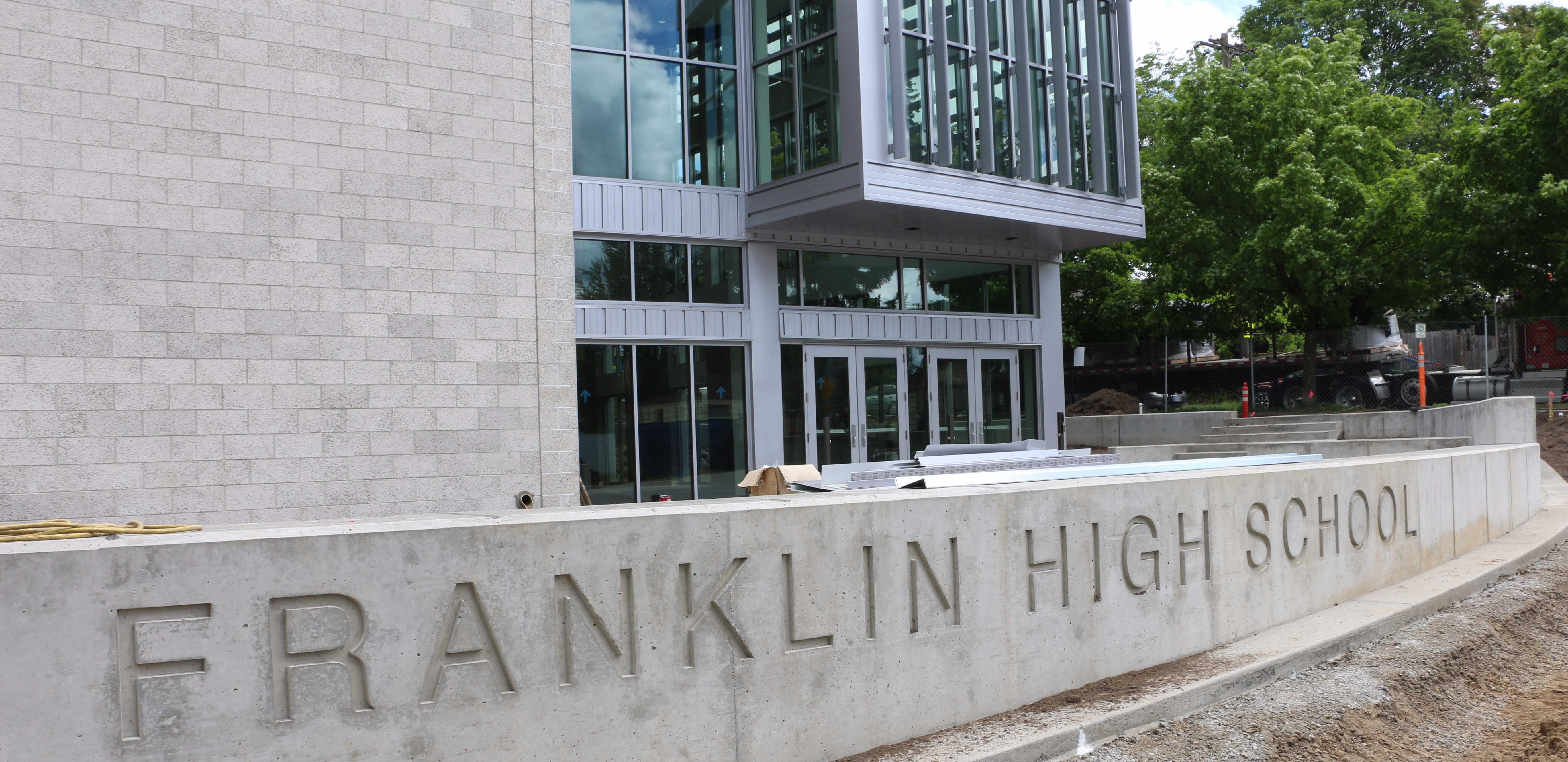
I owe my music career to PPS. Often people think of professional musicians coming from special performing arts schools, or home schooling, or some sort of special educational arrangement that fosters musical talent. This was not the case with me. My career was started by joining a before-school jazz band in the sixth grade. Though I had been given a foundation in classical piano, I had no experience whatsoever with jazz. If Mt.Tabor Middle School had not allowed the SUN school program to teach a tiny jazz band twice a week at seven in the morning, I would be a completely different person. That band sparked my interest in jazz, leading me to pursue it and eventually turn it into a career. With first place and second place awards in four different national competitions, and regular gigs around the city of Portland, I plan on applying to music school and becoming a professional jazz pianist. I owe it all to the music programs of PPS. This is why it is so distressing to me that our own jazz band here at Franklin is being cut next year.
A number of students and alumni share my concerns. Devina Boughton graduated from Franklin in 2016 and currently attends Berklee School of Music, one of the most prestigious music schools in the country, and majors in jazz studies. “For that facet of music education to be lost is really a blow . . we need to make sure that jazz is accessible for everyone to try out, at a basic level to an advanced level.” Boughton was also introduced to jazz through PPS, and though Franklin’s jazz band was small and horribly underfunded, it was still important to her. “The jazz program may not have been really great, but the fact that it was there provided an outlet . . . even when Riley (the drummer) had to use a cardboard box as a bass drum.”
Jesse Fuller (10) has also found the jazz program to be very valuable. “For me, in the last two years, it’s really been an outlet to kind of learn and delve into jazz in a way that I hadn’t really had an opportunity to before . . . to have a kind of self-led exploration of jazz was a great break from everything else in the day.”
Other students agree, including Theo Bennett (10). “I want to do jazz when I’m older, and it really sucks to have an outlet be taken away . . . It makes me pretty sad . . . My mom’s a teacher and she’s worked in some of the poorest districts, and they’ve had way better band programs than Franklin’s had for years.” It’s true that other schools with poor arts funding still manage to keep their jazz programs thriving. Franklin will be one of the very few high schools in Portland with no jazz program next year. This actively handicaps young jazz musicians at Franklin, since almost all local opportunities in jazz music cannot be accessed independently. Only with a school jazz band can a student attend competitions like the West Salem Jazz Festival and other exciting opportunities. This inability to compete will affect students’ chances at getting into music school. I myself have been prevented from enjoying opportunities that kids from other schools get to have, because I go to Franklin. Other schools like Grant High School and Beaumont Middle School are competing at the national level. So why aren’t we? Why are we getting cut instead?
According to band director Mike McClaren, there are a number of reasons. “(Franklin) jazz lacks a feeder structure whereas choir can have a beginning choir and then an auditioned choir to keep growing and advancing, band can have beginning and advancing levels, strings can have beginning and advanced, there is no beginning level for jazz. So, we run into the same problem: we have students with a lot of experience and students with no experience and no way to bridge the gap. Also, whereas band and choir have feeder programs in our middle schools and K-8’s, the jazz students at Mt. Tabor, typically speaking, are also Japanese immersion, and so their high school track takes them to Grant. So, when we graduate Seniors from Franklin’s jazz program, they are not replaced by Freshmen. It’s a no-growth model. And in light of budget cuts, and necessity to keep the music department growing and active, it made sense to focus on programs that are sustainable right now.” McClaren went on to explain how the administration’s inability to hire more than one teacher to manage the the music programs contributed to the shortcomings of the music department overall. “When I was a student, music programs were growing. There was a band teacher, there was a choir teacher, there was a strings teacher . . there were opportunities . . . this hyper-focus on common core, academics . . . what have we lost in the middle? We’ve lost the arts.”
Over the past few decades, Franklin music teachers have not had any sort of past experience with jazz. When a new teacher comes, it’s up to the students to guide the teacher in the ways jazz differs from classical and pop music. Boughton believes that this is one of the main causes of the program’s demise. “We should have separate teachers teaching choir and strings and teaching jazz and symphonic . . . and at the high school level, it shouldn’t be a place that’s purely foundational, we should have more advanced happenings. We shouldn’t be struggling for things to not be cut.”
This lack of support for music at the elementary and middle school level suggests a district-wide issue. Mt. Tabor is the only middle school that feeds into Franklin with a jazz program. Bridger, a K-8 that feeds into Franklin, has only a choir to sustain nine years of music education for its students. Bridger is also one of the most underfunded schools in the district, and is heavily populated by children of immigrant communities. The convergence of poor funding and immigrant status may be a coincidence, but it also could be a result of classism embedded in the funding processes of the PPS administration.
Franklin Principal Juanita Valder made the ultimate decision to end the jazz program. Faced with budget cuts and a retiring band director, Valder had to make decisions on what could stay and what could go in the music department. “In the case of cuts, then we go with what we call ‘core first’ which means that we’re mandated to have a particular series of classes so that we’re identical to to every other school in the system. . .When it comes down to how many sections we offer and how many opportunities we give, then it becomes a little more gray in how those decisions are made,” she said. “In the case of jazz per se, it was a little different in the sense that we had to meet a requirement by the district (that all schools have to have) instrumental music and vocal music. I couldn’t afford to get a half time choir teacher and keep all the band sections; I didn’t really have enough band sections to have a full time teacher. . . to hire a teacher we needed somebody who could do strings, who could do band, and who could do choir, and jazz became kind of a genre more than a skill base. So that genre becomes a specialty that we just couldn’t offer.” Arts funding was decreased, so Valder chose to cut jazz because it isn’t technically required by the district and it was struggling more than the other music classes.
If there wasn’t enough band sections to get a full time band teacher, perhaps we could have made a beginning and advanced jazz band, which would have solved the problem McClaren discussed about how it was impossible to teach all skill levels in one class. In addition, the widely held belief that jazz music is a “specialty” and not an essential must be dispelled. We are not in Europe, so why are three different kinds of European music automatically prioritized over American music? Perhaps it is the fact that jazz was first an African American art form before it was claimed by the dominant culture and hailed as the Great American Art Form. The systems put in place in many school district administrations continue to disrespect and de-prioritize jazz. The immediate response to budget cuts in the music departments of all schools seem to be to preserve European music and destroy African American music.When a school gets arts funding, it tends to begin with strengthening a band program dominated by European music. Jazz is treated as an afterthought. The fact that instrumental music and choir are required, but non-European music is not a requirement, shows how the white dominant culture continues to control the ways in which our youth are educated.
Nearly every day, a teacher or administration member asks me if I am excited for the new performing arts center at the renovated Franklin campus. Every time, it feels like a slap in the face. No, I am not excited. What do they expect me to play in it? I would trade that shiny new building for a jazz band in a heartbeat. I’m a jazz musician; that’s who I am, but apparently that’s not something Franklin will let me be. I want to have Quaker pride, but right now I’m finding it very hard to take pride in a school with one of the worst music programs in the city. I can only hope that PPS and Franklin start to value jazz music and the arts as a whole, and start respecting it as much as they respect the myriad of academic and sports programs they pour money and effort into year after year. Students have already begun preparing a “jazz music club” that will attempt to replace an actual class for the time being. Students and parents must raise awareness about this district-wide problem. We must get jazz into every middle school so that every high school can have enough jazz students. We must demand better funding for the arts, and we must demand that the administration give us back our band. This is for the musicians of the future. I feel personally responsible for making sure they will have the resources I had. This is bigger than all of us. Jazz must not go extinct.
































